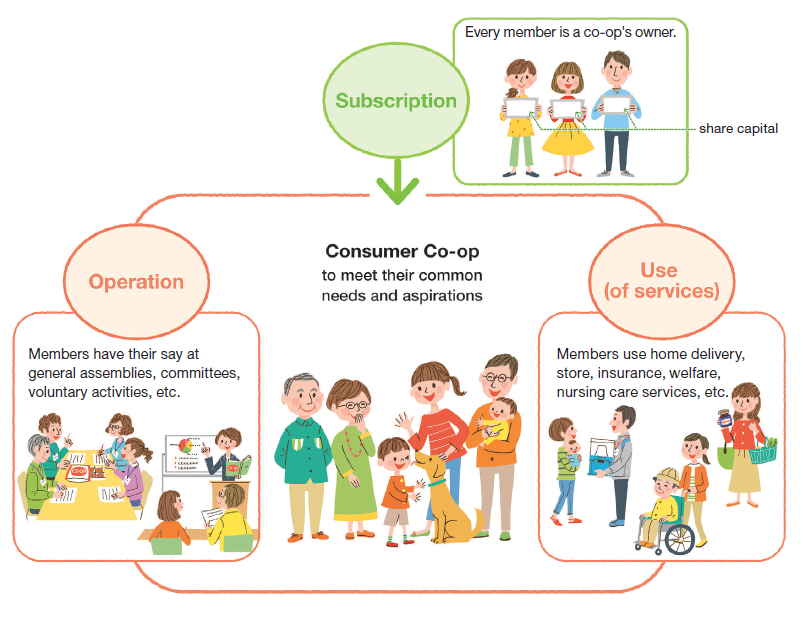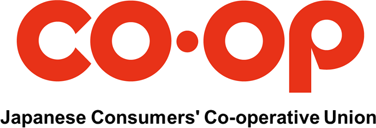What is Consumer Co-op?
A consumer co-op is an autonomous association of consumers united voluntarily to meet their common needs and aspirations.

The Characteristics of Japanese Consumer Co-ops
Consumer Cooperatives Act regulates consumer co-ops; the act classifies the co-ops into categories according to the type of business and does not permit consumer co-ops to do banking business. Each consumer co-op is permitted to do business only in the prefecture where it is registered. In principle, non-members are not allowed to use co-op's services.
Types of Consumer Co-ops in Japan
Community-Based Retail Co-ops
Community-based retail co-ops serve local residents through home delivery, store and catalog business, insurance and welfare service.
University Co-ops
University co-ops serve students and faculty members in universities and colleges through operating bookstores, convenience stores, cafeteria and other services.
National Federation of University Co-operative Associations (NFUCA), which is affiliated with JCCU, is a national association of university co-ops.
School Teachers' Co-ops
School teachers' co-ops serve teachers at both public and private elementary, junior and senior high schools, mainly through catalog business.
Institutional Co-ops
Institutional co-ops serve employees at their workplaces through operating stores and cafeterias.
Expanded Institutional Co-ops
Expanded institutional co-ops serve both employees and residents in neighboring residential areas.
Health and welfare co-ops are founded under the Consumers' Livelihood Co-operative Society Law to help local residents deal with problems related to their health and daily life. Health and welfare co-ops own and operate medical-care and nursing-care facilities such as hospitals, primary health care centers, nursing care homes, home-visit care stations, rehabilitation facilities, and at-home help services for the elderly. In addition, local residents who support the co-op as members and the staff cooperate with each other to conduct businesses and activities to solve livelihood-related problems.
Japanese Health and Welfare Co-operative Federation (HeW CO-OP JAPAN), which is affiliated with JCCU, is a national federation of health and welfare co-operatives that engage in health and welfare businesses.
Insurance co-ops offer life and other insurance products that suit members' needs with more reasonable premiums and better coverage. There are two types of insurance federations that are affiliated with JCCU; Japan CO-OP Insurance (Kyosai) Consumers‘ Co-operative Federation (CO・OP Kyosai) which is a union of 357 member societies from across the nation including JCCU, and the other, the National Federation of Workers and Consumers Kyosai Cooperatives (Kokumin Kyosai co-op) which offers insurance mainly to trade union members.
Housing co-ops provide houses, make extensions or reconstruction of buildings, etc. to co-ops members at reasonable prices. They provide services to their members in cooperation with real estate developers.
Presiding Ministry and Governing Law for Consumer Co-ops
In Japan, the supervisory authority for consumer co-ops is the Ministry of Health, Labour and Welfare, and the act on which they are governed is Consumer Cooperatives Act. Similar to other types of co-operative associations, they are given tax concession. They perform their business independently from the government and are granted no subsidies.
| Presiding Ministry | Governing Law | |
| Consumer Co-ops | Ministry of Health, Labour and Welfare | Consumer Cooperatives Act |
|---|---|---|
| Agricultural Co-ops | Ministry of Agriculture, Forestry and Fisheries | Agricultural Co-operatives Act |
| Fishery Co-ops | Fishery Cooperative Act |
